- Yokohama-shi Top Page
- Health, Medical and Welfare
- Health and Medical Care
- Municipal hospitals
- Yokohama City Apolexy and Spinal Nerves Center
- To all local organizations
- Introduction of community-based comprehensive care wards
Here's the text.
Introduction of community-based comprehensive care wards
Last Updated June 4, 2024
In our community-based comprehensive care ward, we accept patients who are undergoing medical treatment at home and patients who have completed acute treatment, have them recuperate, and provide support for medical treatment after discharge. .
- Target Patients
- Information on rooms and equipment
- Hospitalization period
- Main expenses for hospitalization
- Flow of hospitalization
- Efforts to Neuro incurable disease
- Nursing in a community-based comprehensive care ward
Target Patients
- Those who are recuperating at home or at nursing homes and need treatment for fever, dehydration, pneumonia, etc.
- Those who are undergoing home medical treatment who need medical care and who have difficulty temporarily nursing at home
- Those who have completed treatment in the acute ward and need a preparation period to prepare a support system for home medical treatment
- Those who our physician deems that specialized medical rehabilitation is necessary [rehabilitation per day: 40 minutes in principle (2 units)]
※Even those who do not apply professional rehabilitation, nursing staff support the living activities themselves, such as toilets, meals, and bathing, during hospitalization, as rehabilitation, in order to return to home life. We aim to maintain and improve functions and ability to operate.
Information on rooms and equipment
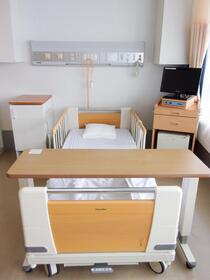
4-person room
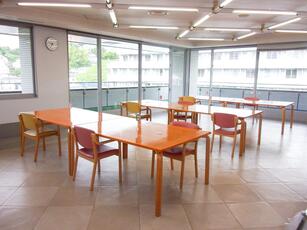
Dining room
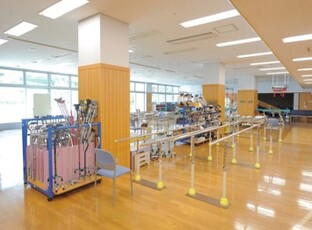
Rehabilitation exercise therapy room
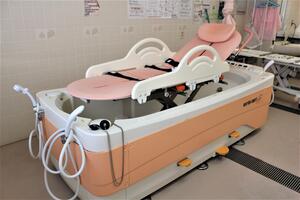
Bathroom
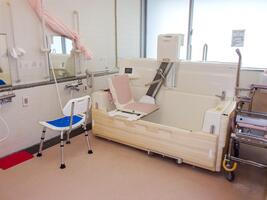
Bathroom
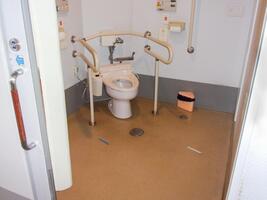
Toilet
- TVs and refrigerators are charged (prepaid card type).
- Free Wi-Fi is available.
※There is also a private room.
Hospitalization period
The period during which our physician deems hospitalization necessary due to medical conditions (up to 60 days)
Main cost of hospitalization (in the case of hospitalization for those who are being treated at home)
Revised in June 2024
Hospitalization expenses per day For those who pay 10% of late-elderly patients Hospitalization
Approximately 4,500 yen on the first day
About 3,800 yen on the second day
About 3,500 yen from the 15th day
Dietary expenses per day 1,470 yen (490 yen per meal)
16,500 yen (tax included) per day when using a paid private room
480 yen (tax included) per day for rental of sleepwear, towels, etc.
700 yen (tax included) per day when using a diaper set
※In addition, there will be additional costs depending on the patient's condition.
Flow of hospitalization
Please contact the consultation room first.
Efforts to Neuro incurable disease
Diseases in the brain nerve Internal medicine area are diverse as shown in the table below. Among them, neuroimmune diseases, degenerative diseases, and muscle diseases are called neuro incurable disease, and there are many diseases that require long-term medical treatment. Among all specific diseases specified by the Ministry of Health, Labour and Welfare, neuromuscular diseases account for approximately 25%, and the number of patients is increasing as the population ages.
In this hospital, mainly in the community-based comprehensive care ward, in addition to diagnosis and medication adjustment of patients with neuroincurable disease who are being treated in the community, treatment for complications such as infectious diseases and fractures due to falls, and treatment for rehabilitation and home environment adjustment after treatment in the acute ward of other hospitals.
Diagnostics include neuroimaging (nuclear medicine tests such as brain MRI and DATSCAN), physiological tests such as electroencephalograms, and electrocardiograms, as well as three-dimensional analysis using a sterEOS imaging system for posture abnormalities, and highly specialized tests such as equilibrium function tests related to easy-to-fall pathology.
In addition, we intervene in team medical care by doctors, nurses, pharmacists, dietitians, rehabilitation therapists, and medical social workers so that patients who have lost their daily activities due to the progress and complications of Neuro incurable disease itself can return to home care with peace of mind.
The treatment period for patients with neuroincurable disease is long, and the mental and physical fatigue accumulated in the family that supports them is also a major problem. In our hospital, we actively accept hospitalization (respite hospitalization) for the purpose of nursing care leave for family members who are treated at home, mainly in neuroincurable disease. In 2019, we accepted 21 patients in 2019 and 34 patients in 2020, including patients with a lot of medical care, such as the use of home respirators and tube feeding from gastrostomy.
We will continue to work to meet the needs of patients with neuroincurable disease who are recuperating in the community and community medicine and nursing staff who support recuperation.
| Cerebrovascular disorder | Cerebral infarction, cerebral hemorrhage, transient ischemic attacks, etc. |
|---|---|
| Functional diseases | Headache, dizziness, epilepsy |
| Immunity Diseases | Multiple sclerosis, optic spinal corditis, severe muscle aspharmacia, etc. |
| Degenerative Diseases | Parkinson's disease, amyotrophic lateral sclerosis (ALS), spinal cord cerebral degeneration, etc. |
| Metabolic disease | Wellniquee encephalopathy, mitochondria disease, etc. |
| Infectious diseases | Bacterial meningitis, viral encephalitis, etc. |
| Peripheral Neuropathy | Guillain-Barre syndrome, hereditary neuropathy, etc. |
| Muscular disease | Muscular dystrophy, muscle inflammation, etc. |
Evaluation of Parkinson's disease cases with side bending to the right (Pisa sign)
Nursing in a community-based comprehensive care ward
In the community-based comprehensive care ward, we aim to provide nursing that values the personality and play a part in realizing "sometimes hospitalization, almost home." In cooperation with doctors, rehabilitation therapists, pharmacists, dietitians, medical social workers, discharge support nurses, etc., so that even if some physical function declines and you are hospitalized, you can return to your home where you are accustomed to living as much as possible. We provide consultation and coordination for discharge from the time. In addition, we also provide pre-discharge conferences with local medical and welfare workers and guidance on visits after discharge with visiting nurses, and strive to cooperate with the community.
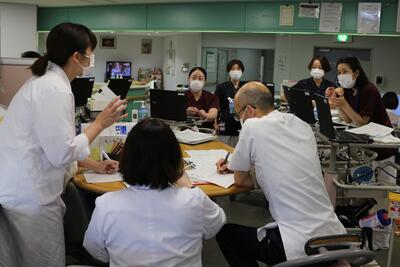
State of multi-disciplinary conference
An episode of a patient who felt good to support home medical treatment
The patient was older and bedridden, and had reduced cognitive function. Due to the medical treatment and the large amount of nursing care, the family was confused about medical treatment at home, but the family, discharge support nurses, ward nurses, and doctors proceeded with discussions and chose home medical treatment. . Before discharge, we coordinated the services used with care managers and visiting nurses, ward nurses provided nursing care guidance, and families were discharged with determination and anxiety about nursing care.
On the seventh day after discharge, a ward nurse visited your home along with a visiting nurse. "There is no problem with the use of home-visit care, home-visit nursing, day service (elderly day care), etc. Above all, I'm glad to feel that I'm getting better little by little, such as singing songs to my favorite music at home. " I think that support for home medical treatment has led to a good time for this patient and family. We will continue to work closely with the community to provide nursing tailored to individual patients and families.
Inquiries to this page
Yokohama City Apolexy and Spinal Nerves Center Medical Affairs Division
Telephone: 045-753-2500 (Representative)
Telephone: 045-753-2500 (Representative)
Fax: 045-753-2904 (direct)
Page ID: 480-342-745







